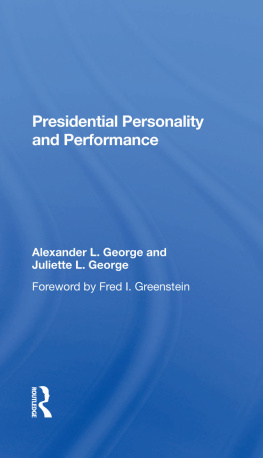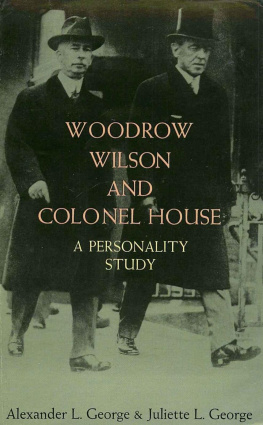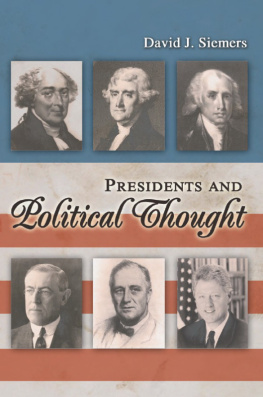First published 1981 by Westview Press, Inc.
Published 2019 by Routledge
52 Vanderbilt Avenue, New York, NY 10017
2 Park Square, Milton Park, Abingdon, Oxon OX14 4RN
Routledge is an imprint of the Taylor & Francis Group, an informa business
Copyright 1981 Taylor & Francis
All rights reserved. No part of this book may be reprinted or reproduced or utilised in any form or by any electronic, mechanical, or other means, now known or hereafter invented, including photocopying and recording, or in any information storage or retrieval system, without permission in writing from the publishers.
Notice: Product or corporate names may be trademarks or registered trademarks, and are used only for identification and explanation without intent to infringe.
Library of Congress Cataloging-in-Publication Data
George, Alexander L.
Presidential personality and performance / Alexander L. George and Juliette L. George ; with a foreword by Fred I. Greenstein.
p. cm.
Includes bibliographical references (p. ) and index.
ISBN 0-8133-2590-0 (hardcover). ISBN 0-8133-2591-9 (paperback)
1. PresidentsUnited StatesHistory. 2. PresidentsUnited StatesPsychology. 3. Personality and politicsUnited StatesHistory. I. George, Juliette L. II. Title.
JK511.G46 1998
324.6'3'0973dc21
97-32849
CIP
ISBN 13: 978-0-367-28421-3 (hbk)
Fred I. Greenstein
IT IS COMMONLY SAID THAT the American political system is one of laws and institutions rather than individuals; but Harry Truman, not some abstract commander in chief, authorized the use of the atom bomb; Lyndon Johnson, not the impersonal forces of the Cold War, authorized the transformation of the American advisory mission in South Vietnam into a full-scale military intervention. For better or worse, the personalities of presidents are as integral a part of the American political system as the constitutionally mandated instruments of government and are equally in need of close and continuing attention.
As unexceptionable as the previous assertion may seem to the layperson, specialists in the study of American politics and other intellectuals tend to be skeptical of efforts to account for political developments of any consequence in terms of the individual characteristics of presidents and other policymakers. Historians are critical of "the presidential synthesis." Political scientists devote far more attention to institutions than to individuals. Intellectuals in general, especially those who are directly or indirectly influenced by Marxism and other doctrines of historical inevitability, are particularly dubious of claims that individuals can make a difference, or at any rate that the impact of individuals on events is susceptible to rigorous inquiry.
A number of assumptions appear to account for such skepticism about the importance of the personalities of presidents and other political actors. One is that analyses of individuals are inevitably messy and imprecise and therefore cannot provide valid insights into the causes of historical outcomes. A second is that attempts to explain events in terms of the attributes of the participants are in their nature misguided, because they fail to account for the institutions and contexts within which actors are embedded. A third is that the occurrence of particular individuals in particular roles at particular periods of time is fortuitous and therefore not of systematic interest.
All three premises are flawed. The argument that presidential personality is of no interest because it is difficult to study has no more merit than that of the drunkard who lost his keys in a dark alley and searched for them under a street lamp, declaring, "It's lighter here." If the connections between the personalities of political actors and their political behavior are obscure, that is all the more reason to seek to illuminate them. The notions that attention to individuals precludes attention to their contexts and that the randomness of the occurrence of personality characteristics makes them unworthy of study are equally fallacious, as can be seen by considering the following analogy. Suppose that the institutions and other channels of the political process were the circuitry of a complex computer and that presidents and other leaders were its control mechanism. Attention to the qualities of the controls would not preclude attention to the mechanism that triggered them. Quite the contrary. And it would be all the more urgent to know the performance characteristics of controls if their operating properties were random, with some capable of tripping at inappropriate times, causing the loss of valuable information, and others failing to trip, exposing the system to the danger of meltdown.
The impact of presidential psychology on American (and by extension global) politics can be extraordinary. For evidence of that, one need only think of the natural counterfactuals that are provided by the possible substitution of presidents with their vice presidents. Without attempting to resolve the many debates about whether the Cold War would have occurred if Franklin D. Roosevelt had lived, or whether the United States would have intervened in Vietnam in a Kennedy presidency, few would argue that those events would have taken the precise form they did if either chief executive had lived. Similarly, the entire course of the 1930s and 1940s almost certainly would have been drastically different if the assassin whose bullet narrowly missed FDR early in 1933 had found his mark and the distinctly pedestrian John Nance Garner had taken office. The 1950s probably would have been different if Dwight Eisenhower had died before the 1954 Dien Bien Phu crisis and Vice President Richard Nixon, who favored U.S. intervention, had been in the Oval Office. And the 1960s might have been dramatically different if Vice President Hubert Humphrey, who opposed U.S. military intervention in Vietnam, had taken over early in 1965.
For many years one of the best ways for those intrepid scholars who were determined to identify the human antecedents of political behavior to learn their craft was to hunt down the often fugitive writings of Alexander and Juliette George. No writer since Harold D. Lasswell has contributed more than Alexander L. George to the congeries of the often disparate and tenuously connected intellectual enterprises that make up the field of political psychology. From the vantage point of the 1990s, however, that contribution might well seem mainly to have been through his writings on the psychology of collective political behavior, which place special emphasis on cognitive aspects of political decisionmaking, deterrence, coercive diplomacy, and crisis management. The relevant references would be to a prodigious outpouring of work, the bulk of which appeared in print after the 1960s (e.g., George, 1972, 1980, 1983, 1991; George, Hall, and Simon, 1971; George and Smoke, 1974).
Yet even if none of Alexander George's post-1960s contributions to the understanding of system-level phenomena had been made, his and Juliette L. George's contributions to that hybrid discipline would still be seminal. But they would be viewed as having been in an area that to some would seem peripheral to his later scholarshipthe psychology of individual political behavior, including not only its cognitive but also its affective and psychodynamic aspects.















